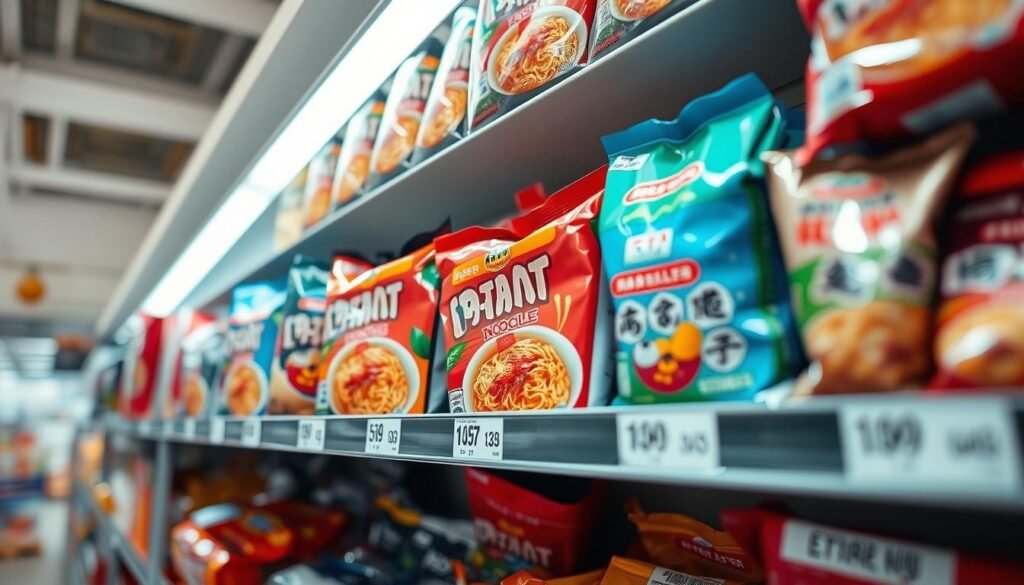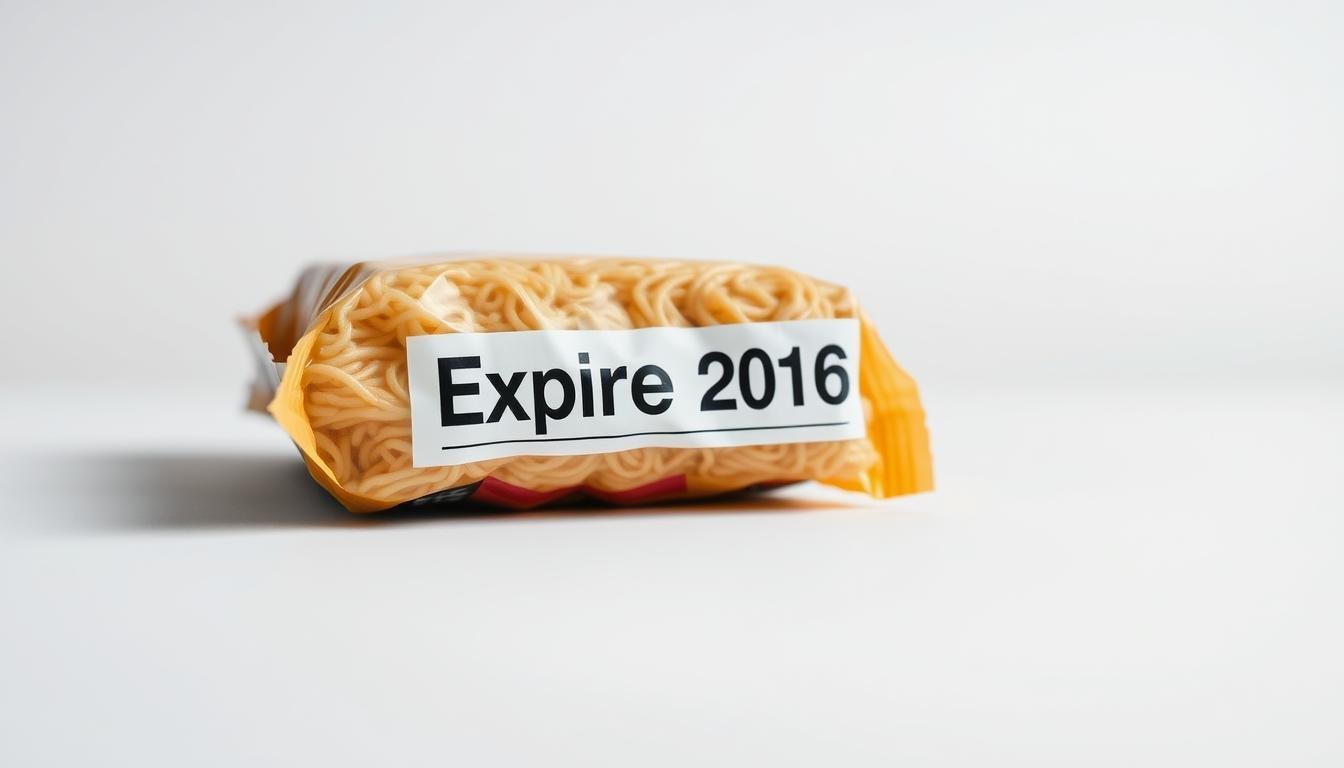Last updated on December 11th, 2025 at 02:49 pm
Is It Safe to Eat Instant Noodles After Expiration? Have you ever wondered if it’s safe to eat instant noodles after they expire? Many people worry about this, especially since these meals are so convenient. It’s important to know how the expiration date affects food safety.
The expiration date on instant noodles can be confusing. It doesn’t directly tell you if the noodles are safe. But, it does show when the manufacturer last checked the noodles’ quality. Eating instant noodles after this date might not harm you. But, it could change how they taste, feel, and what nutrients they have.
So, what happens if you eat instant noodles after they expire? The key is to understand food safety rules and what affects how long noodles last. [Is It Safe to Eat Instant Noodles After Expiration?]
Contents
- 1 Understanding Expiration Dates on Instant Noodles
- 2 The Composition of Instant Noodles
- 3 Signs Your Instant Noodles Have Gone Bad
- 4 Can You Eat Instant Noodles After Expiration Date?
- 5 Potential Health Risks of Consuming Expired Noodles
- 6 Factors Affecting Instant Noodle Shelf Life
- 7 Proper Storage Practices to Extend Shelf Life
- 8 Summary of Key Points for Safe Instant Noodle Consumption
- 9 FAQ: Is It Safe to Eat Instant Noodles After Expiration?
- 9.1 What do expiration dates on instant noodles signify?
- 9.2 How can you tell if instant noodles have gone bad?
- 9.3 Are expired instant noodles safe to eat?
- 9.4 What are the potential health risks of consuming expired instant noodles?
- 9.5 How can you extend the shelf life of instant noodles?
- 9.6 Can the preservatives in instant noodles affect their shelf life?
- 9.7 What is the best way to store instant noodles?
- 9.8 How do storage conditions affect the shelf life of instant noodles?
Understanding Expiration Dates on Instant Noodles
It’s important to know the expiration dates on instant noodles to ensure they are safe and of good quality. You might have seen a date on the packaging of instant noodles. But what does this date really mean?
Types of Expiration Dates
There are two main types of dates on food: “Best By” and “Use By.” “Best By” means the product’s quality is guaranteed by the manufacturer. “Use By” is the last date to use the product at its best quality.
| Date Type | Description |
|---|---|
| Best By | Manufacturer’s guarantee of quality |
| Use By | Last date for peak quality |
The shelf life of instant noodles depends on how they are stored and packaged. These products usually last a long time because they have low moisture and preservatives. But, always check the packaging for any damage or signs of wear.
The Composition of Instant Noodles
Instant noodles are made from a mix of carbs, seasonings, and preservatives. These ingredients help make the noodles tasty and last longer. They usually have flour, starch, and vegetable oils to give you energy.
Preservatives are important for keeping noodles fresh. TBHQ (Tertiary Butylhydroquinone) and BHA (Butylated Hydroxyanisole) stop fats and oils from going bad. This helps prevent the noodles from spoiling.
| Ingredient | Function |
|---|---|
| Flour and Starch | Provide carbohydrates |
| Vegetable Oils | Enhance flavor and texture |
| TBHQ and BHA | Preservatives to prevent spoilage |
Knowing what’s in instant noodles helps you choose better. While they’re easy to grab, knowing their ingredients is important. It helps you eat them safely.
Signs Your Instant Noodles Have Gone Bad
Before you eat instant noodles, make sure to check for signs of spoilage. Bad noodles can harm your health. A strong or sour smell is a big warning sign. Fresh noodles usually smell neutral or slightly salty.
Look closely at the noodles too. Watch out for mold, sliminess, or bugs. If they look different, dry, or if the package is torn, don’t take a chance. Also, if the seasoning packet is rusty or the noodles feel odd, they’re probably bad.
Always check the expiration date and the packaging’s condition before eating. Spotting these signs of spoilage can keep you safe from eating expired noodles.
Can You Eat Instant Noodles After Expiration Date?
Wondering if you can eat instant noodles after they expire? The expiration date, marked as “Best By” or “Use By,” is about quality, not safety. It tells you when the noodles are at their best. [Is It Safe to Eat Instant Noodles After Expiration?]
Several things affect the safety and quality of noodles after they expire. These include:
- Storage conditions: Noodles kept in a cool, dry spot stay safe longer.
- Packaging integrity: If the packaging is damaged or open, noodles are at risk of getting contaminated.
- Visible signs of spoilage: Look for color, texture, or smell changes.
Usually, noodles stored right and with unbroken packaging are safe to eat after their expiration date. But, they might not taste or feel as good as they did before.
To keep food safe, always check the noodles before eating. If unsure, it’s safer to avoid them. Eating expired noodles might not make you sick, but it could ruin your meal.
In summary, the expiration date is a guide for the best taste and texture. But, it’s not a strict rule for safety. You can eat noodles after they expire if they’re stored well and look fine. Just make sure to inspect them carefully and trust your instincts.
Potential Health Risks of Consuming Expired Noodles
Expired instant noodles can be harmful to your health. The quality and safety of expired noodles are not guaranteed.
One big worry is bacterial growth. This includes Staphylococcus aureus and Bacillus cereus. These bacteria can cause food poisoning. [Is It Safe to Eat Instant Noodles After Expiration?]
Risks Associated with Specific Ingredients
Some ingredients in noodles can be dangerous when they expire. For example, the oil can turn rancid. This leads to harmful compounds.
| Ingredient | Potential Risk When Expired |
|---|---|
| Dried Vegetables | Loss of nutritional value, potential for mold growth |
| Preserved Meats | Increased risk of bacterial contamination, formation of carcinogenic compounds |
| Seasoning Packets | High salt content can be problematic, potential for contamination |
To stay safe, always check the expiration dates and the noodles’ condition. If unsure, it’s safer to throw them away. [Is It Safe to Eat Instant Noodles After Expiration?]
Factors Affecting Instant Noodle Shelf Life
How you store instant noodles greatly affects their shelf life. Keeping them properly stored is key to their quality and safety.
Several factors play a role in how long instant noodles last:
- Storage temperature: High temperatures can cause the noodles to degrade faster.
- Humidity: Moisture can lead to the growth of mold and bacteria.
- Packaging: Damaged or opened packaging can expose the noodles to air, moisture, and contaminants.

To extend the shelf life, store instant noodles in a cool, dry place. Keep them away from direct sunlight. Also, make sure the packaging is intact and sealed to preserve the noodles. [Is It Safe to Eat Instant Noodles After Expiration?]
Proper Storage Practices to Extend Shelf Life
To keep your instant noodles fresh, it’s important to store them right. Proper storage is key to extending shelf life. Store them in a cool, dry place, away from sunlight and moisture.
Here are some key storage tips:
- Keep them in their original packaging or transfer to an airtight container.
- Store in a pantry or cupboard away from heat sources.
- Avoid storing near windows or in humid environments.
| Storage Condition | Effect on Shelf Life |
|---|---|
| Cool, Dry Place | Extends shelf life up to the expiration date |
| High Temperature or Humidity | Reduces shelf life, potential for spoilage |
By following these storage practices, you can keep your instant noodles fresh. This ensures they stay safe to eat for as long as possible. [Is It Safe to Eat Instant Noodles After Expiration?]
Summary of Key Points for Safe Instant Noodle Consumption
You now know why checking expiration dates and what’s in instant noodles is key. To stay safe, look for signs of spoilage and keep noodles right. These steps help avoid health problems from bad noodles.
Being careful about how long noodles last and how you store them is important. This way, you can enjoy your noodles safely and keep them fresh. Always check for spoilage signs before eating, even if the date is fine.
See Also: Can You Eat Yogurt a Month After Expiration Date?
FAQ: Is It Safe to Eat Instant Noodles After Expiration?
What do expiration dates on instant noodles signify?
Expiration dates on instant noodles show when the product is at its best. They don’t mean it’s not safe to eat after that date.
How can you tell if instant noodles have gone bad?
Look for mold, sliminess, or a bad smell. If you see any, it’s time to throw them away. [Is It Safe to Eat Instant Noodles After Expiration?]
Are expired instant noodles safe to eat?
It depends on how you stored them and the type of expiration date. If they look and smell fine, they might still be okay. But they might not taste as good.
What are the potential health risks of consuming expired instant noodles?
Eating expired noodles can make you sick. You might get stomach problems, food poisoning, or allergic reactions.
How can you extend the shelf life of instant noodles?
Keep them in a cool, dry place. Away from sunlight and moisture. Use their original packaging or an airtight container. [Is It Safe to Eat Instant Noodles After Expiration?]
Can the preservatives in instant noodles affect their shelf life?
Yes, preservatives help noodles last longer by stopping bacteria and mold. But they don’t work forever.
What is the best way to store instant noodles?
Use their original packaging or an airtight container. Keep them away from heat, moisture, and sunlight.
How do storage conditions affect the shelf life of instant noodles?
Temperature, humidity, and light can change how long noodles last. Storing them right keeps them good and safe. [Is It Safe to Eat Instant Noodles After Expiration?]

Hello, I am Bellamy George, a certified nutritionist and food safety specialist from Springfield, IL. With a degree in Food Science, I share research-backed insights on edible foods, seeds, and seafood for safe, informed eating.

